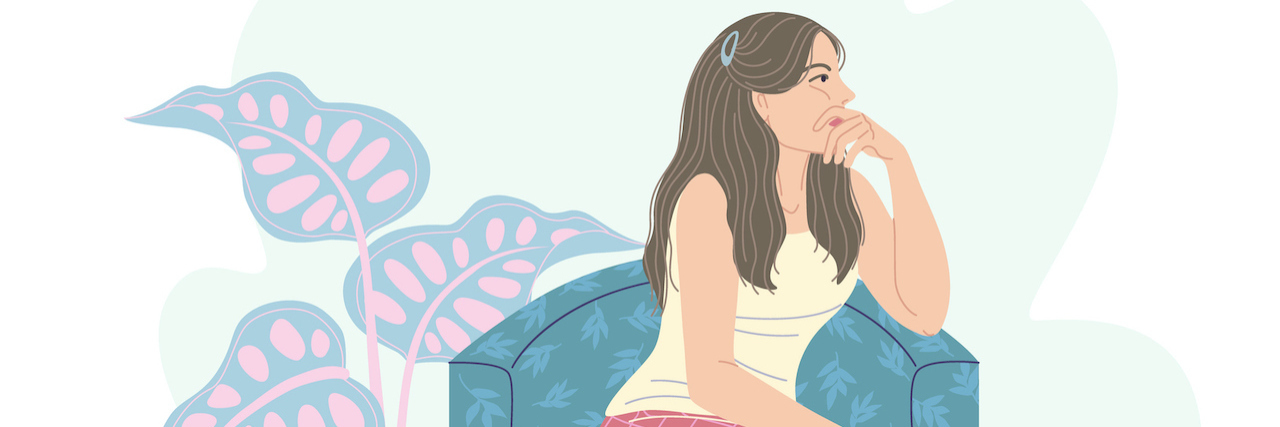I grew up in a depressed state and grew into my anxiety, which didn’t present until I became a mother. It’s not surprising that stepping into a sudden and fierce devotion to living after a lifetime of daring death would cause a bit of whiplash. Presumably, I’d be able to handle another mental illness without help, just like I had survived my depression without meds or counseling in the years leading up to my daughter’s birth. Presumably, my having postpartum depression as the cherry on top would just pass in the same waves my garden variety biological depression had.
Certainly, you’re seeing where this is going: I was wrong, very, very wrong.
I got suicidal for the first time in over a decade, I contemplated self-harm for the first time in a great while, my internal dialogue was reverting back to its old standards — “you’ll never get out of this pain, why not let it ooze instead;” “you’re not worthy of this life, no one should love you, you’re not valuable” — and I had a newborn. Not knowing my worth, having never been taught to value myself, I was terrified of ruining this terribly vulnerable life in front of me.
My husband, then fiancée, was learning on the fly about how to help someone who truly could not get out of bed, or off the floor, or through the tears. He did all he could, but he’d never be able to reach me where I needed to be reached, some dark place nested within my whole self, where only I had been trained to navigate. Nonetheless, without treatment and with his support I survived myself once again, with more tattoos, another child, a college degree and a couple of cross-country moves under my belt.
During that whole “high-functioning” time, I was practicing a great deal of self-stigmatizing behavior, never actually respecting my disorders as valid conditions. It wasn’t until I hit another breaking point after enduring years of awful bosses and working conditions, wherein I never felt safe enough to ask for accommodations or assistance in getting the mental health care I desperately needed. It was only when I began learning to believe that my “over emotionality,” “hyper sensitivity,” “tearful nature” and all the other terms I used to sidestep the truth, were symptoms of very real disorders.
I started calling my symptoms what they were. My bad days started to become symptomatic days, my inability to grin and bear it became a reality dictated by my disorders. I started to realize I wasn’t a depressed person, and that I was actually a person living with depression and anxiety; holding on to the belief that I was innately less capable forced a false expectation that I could “just get over it.” When I started thinking about these conditions akin to other life-threatening disorders, instead of a personal defect, I found an invigorating sense of freedom.
Instead of allowing my depression to spiral out of control in the name of some sort of penance for my flawed existence, I could take meds and get into counseling. I now have a nice comeback when people tell me to “just change your perspective” or “think happy thoughts” or “maybe if you hadn’t been diagnosed you wouldn’t feel this way” or “just get over it,” to which I’ll ask, “Would you say that to someone with another health condition? Just take a deep breath and calm down, you don’t need your medication to survive?”
Just like any other life-threatening disorder the cruel reality of depression and anxiety doesn’t get wished away. Suicide and self-harm are often preventable results of the constant and often silent stigma faced by those of us who literally cannot “think happy, be happy” all the time.
What if we treated depression like a serious health condition and ensure those of us who are living with mental illnesses actually have all the tools they need to manage their symptoms? What if we could default to presuming that mental illness does not equal a damaged person, instead of presuming and implying the exact opposite?
Maybe then it won’t take the next one of us over three decades to realize she’s not what her depression says she is, instead she is a person who has a treatable, albeit life-threatening, disorder with symptoms that should be taken just as seriously as the next person’s. Maybe then we can actually get some sunlight in this dark space and clear out all the misunderstandings and lore around folks like me. Maybe then we can actually talk about suicide and self-harm in a manner that can offer healing and help instead of promoting a false reality in which happiness is everyone’s expected state.
Getty image via Val_Iva

